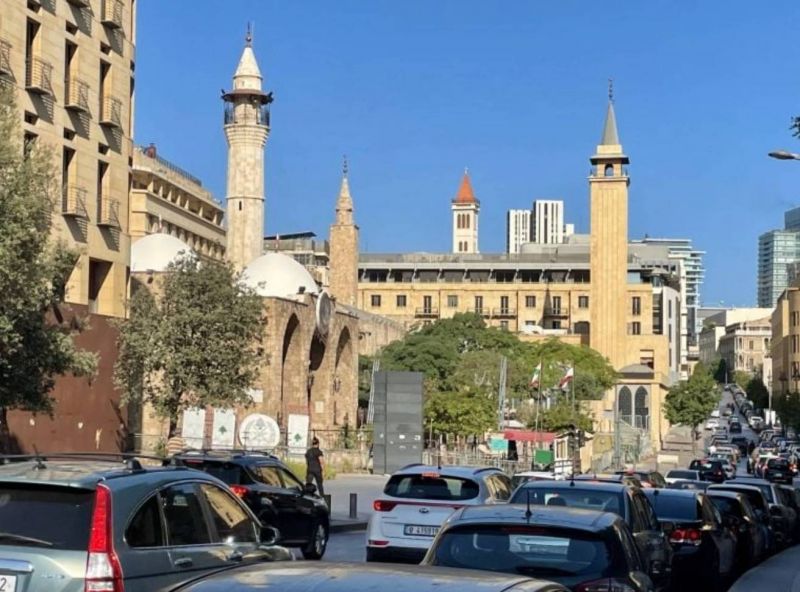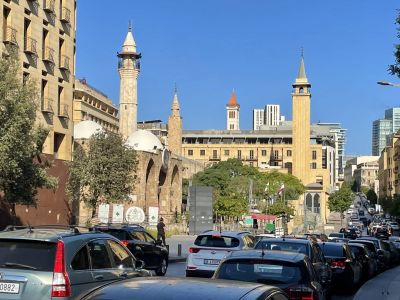
Weygand Street in downtown Beirut. (Credit: Philippe Hage Boutros)
In a statement issued on Thursday, caretaker Deputy Prime Minister Saadeh Chami criticized the deliberate delay in the approval of various draft laws proposing reforms demanded by the International Monetary Fund in return for an aid deal. Chami accused MPs of trying to “shift the blame [for the delays]” to the cabinet.
Chami, who has previously worked with the IMF, believes the parliamentary Finance and Budget Committee has been putting off the examination of two specific draft laws since March. These include drafts to regulate the restructuring of the banking sector, and to establish a legal framework to restore balance to the financial system by addressing the issue of losses.
Chami’s criticism was rejected by the committee’s chairman, Free Patriotic Movement MP Ibrahim Kanaan, who told L’Orient-Le Jour that he planned to convene a meeting next Monday to discuss the two draft laws in question. When contacted, Chami had nothing to add to his statement.
Since 2020, Lebanon has been trying to unlock an IMF deal that could facilitate the recovery of the country’s financial system. A staff-level agreement was signed with the IMF in April 2022, but the Lebanese authorities have yet to meet the necessary conditions to obtain the $3 billion, four year aid package.
A parallel with the 2020 talks
Chami criticized the finance committee for postponing the examination of these draft laws since March, by ordering the requirement of figures “certified by audit firms.” He believes the committee could have started their examination before.
Chami, who also headed the Lebanese delegation involved in negotiations with the IMF following the formation of Mikati’s cabinet in September 2021, drew a parallel between postponing the examination of the draft laws, and the “failure” of the negotiations, which was caused by a “disagreement over figures.”
Initiated in May 2020, the initial IMF negotiations were suspended after a disagreement between the Hassan Diab cabinet and Banque du Liban (BDL) and the banks, supported by some MPs, over the size of the losses that would have to be absorbed by the Lebanese financial system.
On Monday, the finance committee demanded the finalizations of BDL’s forensic audit carried out by Alvarez & Marsal, and the completion of the banks’ audit.
Kanaan further said the cabinet decided to rework its draft law on bank restructuring, and that the MPs have been awaiting its completion.
A cabinet source told L’Orient-Le Jour that the cabinet confirmed its plans to add changes, which it intended to communicate, to the drafts. According the the source, the cabinet did not “officially withdrawn the text.”
Kanaan insisted that MPs could not study such complex draft laws without having all the figures at their disposal, and that the cabinet had not been responsive to their calls. He also said the BDL’s acting governor, Wassim Mansouri, stated at the meeting on Monday that the repayment of bank deposits, which have been blocked by the restrictions in place since 2019, would cost $36 billion. Meanwhile, estimates obtained by the committee amounted to $26 billion. Kanaan believes this difference in figures justifies the committee’s caution.
Financing the audit fo the banks
Kanaan also noted that having an international firm audit the accounts of the country’s 14 largest banks is a prerequisite listed by the IMF in the staff-level agreement, and he expressed surprise that this process had not yet been initiated.
Chami assured that part of the funding required to start these audits had been secured, but that the process “could take a year” and that Lebanon did not have the “luxury of waiting that long.”
According to a another cabinet source, $5 million has been earmarked from the sum allocated through one of the World Bank’s financing mechanisms for Lebanon, which is the Lebanon Financing Facility (LFF).
“Releasing the funds may take several months, but contacts have been made with the World Bank’s Vice President for the Middle East and North Africa region, Ferid Belhaj, to expedite the process,” the source said. Belhaj is currently in Beirut to take part in a series of internal IMF meetings, the same source added.
Sovereign wealth fund, a top priority
Chami also criticized the committee for placing the draft law establishing a sovereign wealth fund to be fed by revenues from offshore hydrocarbon reserves as a top priority, even though these revenues are hypothetical and need several years to yield.
The committee adopted the draft law at the beginning of the month, and it is ready to be voted on in Parliament. Kanaan rejected this criticism, saying that the adoption of this draft “had not cost anything” and that it laid the foundations for the sound management of these revenues in the future.
“This is not the only draft on which the finance committee worked recently. We didn’t stop everything to focus on it,” he said.
This article was originally published in French in L'Orient-Le Jour. Translation by Joelle El Khoury.
